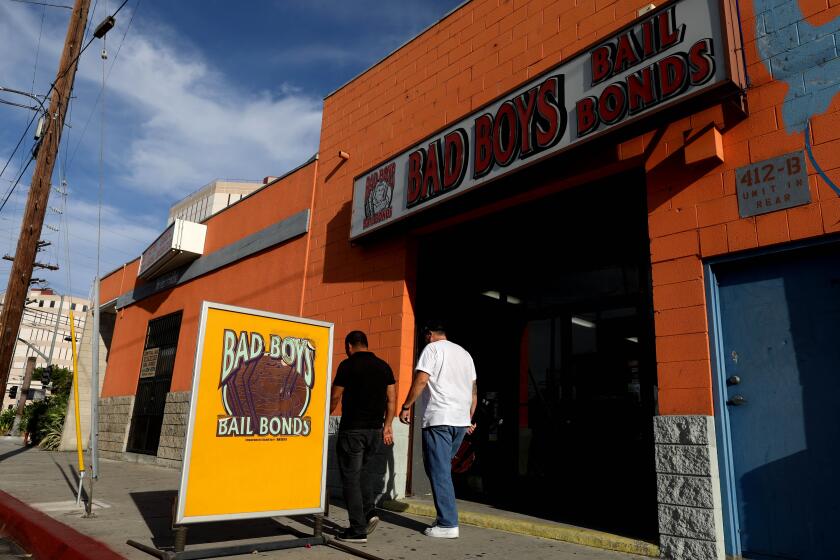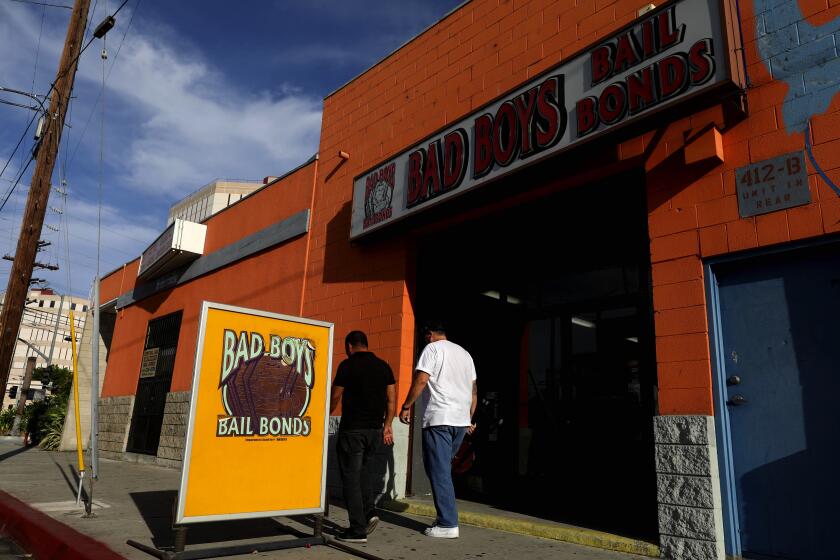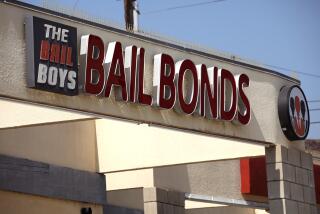Editorial: Presumed guilty! The toxic cost of money bail

- Share via
For all the death, misery and havoc that COVID-19 inflicted during its first three years, the pandemic did bring one short-lived benefit to the criminal justice system, at least in Los Angeles County. It led judges to eliminate money bail for many people accused of low-level crimes.
Their immediate goal was to combat transmission of the disease in L.A. County jails, where conditions are overcrowded and people are shuffled in and out at a rapid pace, leading them to bring the infection back to their families and neighborhoods. Its side benefit was to force L.A., for once, to live out fundamental but long-ignored principles, like the presumption of innocence, and a criminal system blind to wealth or poverty.
L.A.’s brief period of more perfect justice ended last year when the Los Angeles Superior Court rescinded its emergency zero-dollar bail policy.
Last November, several people who were stuck in jail because they couldn’t pay bail, along with some L.A. County taxpayers who foot the bill for the costly and wasteful practice of locking up people before trial, sued on behalf of others similarly aggrieved. In a hearing that began last week, they presented their case for immediately bringing back zero-dollar bail, and making it permanent. The hearing in the case, Urquidi vs. City of Los Angeles, continues Monday.
California judges are circumventing a landmark constitutional ruling meant to stop the misuse of money bail. And it gets worse.
The demand for zero-dollar bail is righteous and should be granted.
Historically, the purpose of bail was to induce the accused to show up for trial (if they did, they got back all the money they deposited with the court). The U.S. Supreme Court ruled that bail can also be used to keep witnesses and others safe but that pretrial release should be the norm.
Around the nation, the debate over money bail has become so politicized that the facts are often obscured. For example, L.A.’s zero-dollar bail program did not cover violent crimes, like armed robbery. It did not prevent judges from ordering high-risk defendants to be held in jail without bail. Examples of high rearrest rates of people released on zero-dollar bail, as reported by the Yolo County district attorney, for instance, are countered by the experience of other counties, including L.A. Rearrest rates vary greatly depending on whether courts or counties provide pretrial services, like simple reminders to return to court on the proper date.
The suit focuses on one widely misunderstood part of the money bail system: bail schedules. These are preset rate sheets for people accused of crimes, and although a committee of judges sets the rates — for example, $20,000 for forgery — the schedules are administered by police.
The conversation about bail reform should be about the role of money but instead keeps zeroing in on crime. Anti-reformers seem to like the confusion.
Here’s how it works. An officer arrests a person on suspicion of committing forgery. At the station, police consult the bail schedule and find the $20,000 rate that the suspect must pay in order to be released before trial. They direct the suspect to a list of phone numbers for bail bond agents who will lend the money for a fee, usually 10% of the bond, or in this case, $2,000. If the suspect can come up with the fee, he can go home and prepare his defense, but he will never get the $2,000 fee back. It’s effectively a punishment — not for being convicted, because there has been no conviction. It’s a penalty merely for being arrested.
If he doesn’t have the bail money, the suspect goes to jail. He will wait there for two to five days until he’s brought before a judge, is formally charged, perhaps gets a court-appointed lawyer and can finally argue that he’s safe to be released because of his ties to the community and his job. But he’s been in jail and missed work so he may well lose his job. He was away from his family. He has been confined to unsafe and miserable conditions, which is traumatizing. Until the hearing, even the prosecutor didn’t know of his case and couldn’t seek dismissal if it was a bad arrest. Once again, it’s a punishment for being accused and, in this case, for being poor.
It’s not like in the TV shows in which the defendant immediately appears before a judge. L.A. has no bail magistrates at police stations, no night courts, no opportunity to avoid either a steep fine for being accused, or a jail term of several days handed down not by a judge but by the arresting officer.
In limiting courts’ ability to impose money bail, the state Supreme Court took a giant step toward justice
The presumption of innocence is an ancient principle, but in Los Angeles — in fact, in much of California and around the nation — it is little more than a slogan. People who are arrested are treated as if they were guilty, long before they have any opportunity to present their defense. They are fined, jailed or both, without a defense lawyer, without even a prosecutor, without a judge.
People with money can buy their way out. Whether we call this classism or make up a word like wealthism, it’s a close cousin to racism, given the wealth gap between white people and people of color.
This wealth-based system of pretrial detention is entirely inconsistent with the principle of equal justice under law. Zero-dollar bail, prudently administered, would be a step toward repairing the injustices that characterize much of the criminal system.
More to Read
A cure for the common opinion
Get thought-provoking perspectives with our weekly newsletter.
You may occasionally receive promotional content from the Los Angeles Times.












